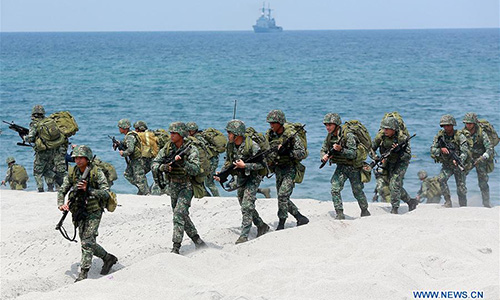US, Philippines hold largest joint military drills in years ‘with different goals’

Filipino soldiers participate in the Amphibious Landing training as part of the 2018 Balikatan Exercises between the Philippines and the United States in Zambales Province, the Philippines, on May 9, 2018.(Xinhua/Rouelle Umali)
The US and the Philippines kicked off one of their largest joint exercises in years on Monday in a region where US media hyped them as facing Taiwan and the South China Sea, but experts pointed out that the Philippines will not become a pawn of the US after seeing what the US has done in Ukraine and Afghanistan.
Codenamed Balikatan 2022, the annual joint military drills include 3,800 Filipino and 5,100 US military personnel, making it the largest iteration of the Philippines-US joint drills since 2015, the Xinhua News Agency reported.
Balikatan 2022 will be conducted across the main Luzon island from Monday to April 8, Xinhua reported, noting that the drills will focus on "maritime security, amphibious operations, live-fire training, urban operations, aviation operations, counterterrorism, and humanitarian assistance and disaster relief."
US media reports, including one by the AP on Monday, hyped that the drills will be a showcase of US firepower in the northern Philippines near the sea border with the island of Taiwan and also facing the South China Sea.
"China will likely frown on the war drills, given their relative proximity to Taiwan," the AP claimed.
However, the AP report also quoted Philippine military spokesperson Colonel Ramon Zagala as saying that the exercise is "for mutual defense, never for offense," and that "most of the military maneuvers have been planned a year ago and did not consider the recurring tensions in the Taiwan Straits."
Cagayan Governor Manuel Mamba told the AP that "We have to engage China, but not in a war, because I know Taiwan is a powder keg." Cagayan is where amphibious landings with limited live-fire maneuvers are scheduled to be held this week.
Some Philippine politicians also expressed concerns that the exercise might threaten regional security, Xinhua reported, quoting presidential candidate and labor leader Ka Leody de Guzman as saying that the Philippines should pursue an independent foreign policy, stressing that the country should not be a "pawn."
By holding the drills, the US is trying to fan the flames and stir up troubles in the Asia-Pacific and benefit from it, just like it has done with the Ukraine crisis, Zhang Junshe, a senior research fellow at the Naval Research Academy of the People's Liberation Army, told the Global Times on Monday.
From a geopolitical point of view, the US is aiming to deter China by rallying more allies and partners, and from an economic point of view, the US wants to sell weapons and equipment to the region, Zhang said.
But judging from the remarks made by the Philippine side, the Southeast Asian country is not going to become a strategic pawn of the US after seeing what the US has done recently in Ukraine and Afghanistan, Zhang said, noting that the Philippines wants to enhance its troops' capabilities but not for offensive purposes.
Ding Duo, a deputy director of the Research Center for Oceans Law and Policy at China's National Institute for South China Sea Studies, warned that despite the ongoing Ukraine crisis, the US is still hyping the situation in the South China Sea, which is a reflection that the US has set its eyes firmly on the Indo-Pacific region.
The US could be seeking a proxy in the region to lead from the front in confronting China, just like what it has done with Ukraine, Ding warned.
China must stay on high alert over US' tactic that could destabilize the region, although countries within the region should see US' intent clearly, the experts said.
The foreign ministers of Indonesia, Thailand, the Philippines, Myanmar and Panama will visit China from Thursday to April 4, according to a Monday statement by Wang Wenbin, a spokesperson at China's Ministry of Foreign Affairs.
Photos
 Increasingly more young adults in China register wills that include virtual assets
Increasingly more young adults in China register wills that include virtual assets Rapeseed flowers turn NW China's Luoping into picturesque spring wonderland
Rapeseed flowers turn NW China's Luoping into picturesque spring wonderland Why do people in China fall for animated characters like LinaBell and Bing Dwen Dwen?
Why do people in China fall for animated characters like LinaBell and Bing Dwen Dwen? Photo Album: architecture in Beijing merging history and modernity
Photo Album: architecture in Beijing merging history and modernity
Related Stories
- Philippines, U.S. kick off large-scale joint military drills
- Commentary: U.S. mounts sneaky cyberattack, while crying stop thief
- Shootings disrupt U.S. over weekend amid public outcry against gun violence
- Is U.S. inflation getting worse or better?
- US practices new war concepts with 100+ drills near China: think tank report
Copyright © 2022 People's Daily Online. All Rights Reserved.






